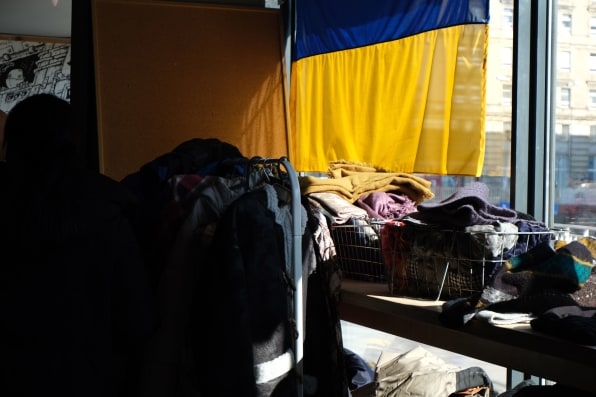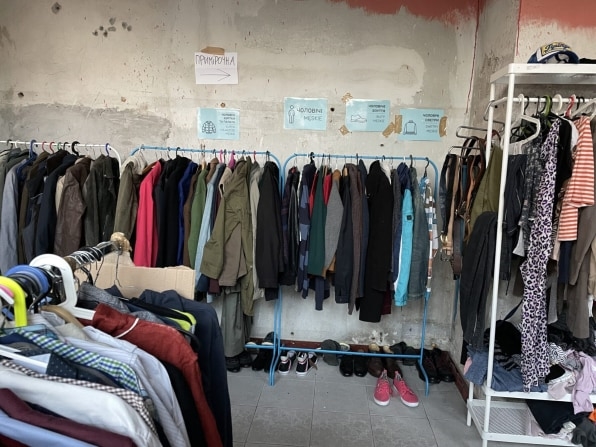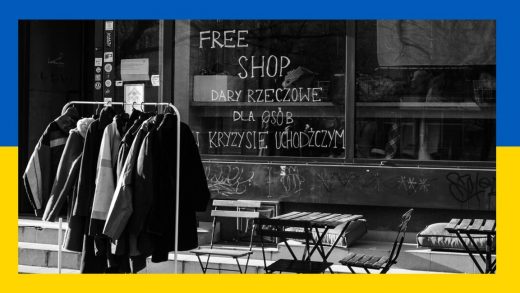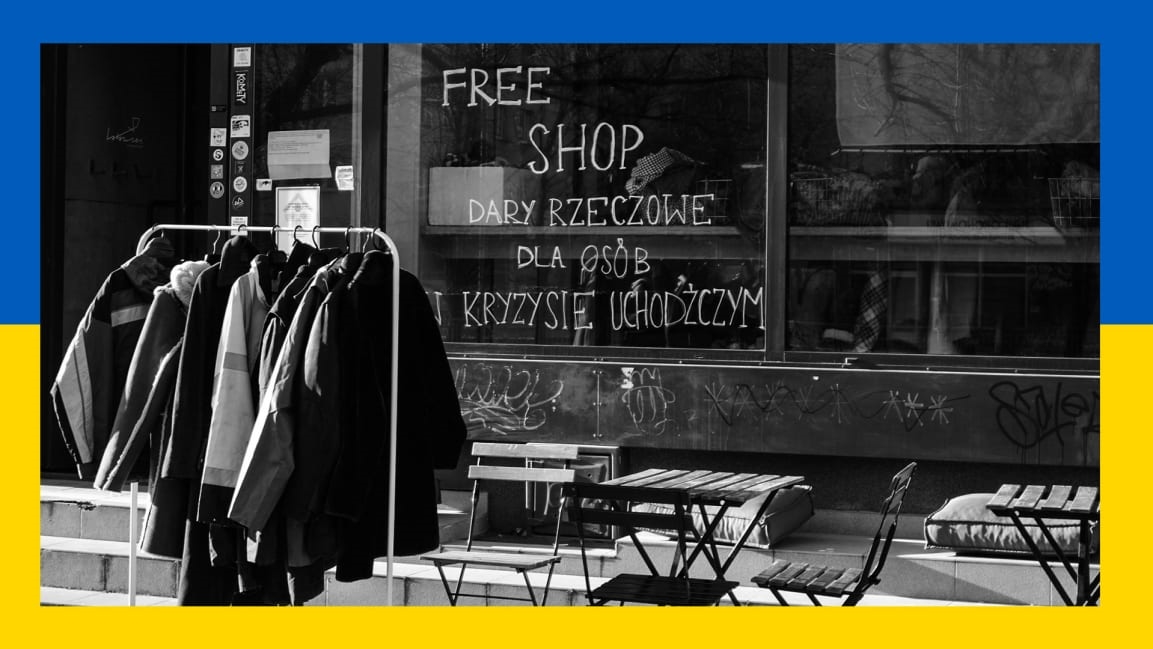For 2 million Ukrainian refugees in Poland, these free stores have become a lifeline
Marina, a 28-year-old puppet theater actor from Kyiv, Ukraine, grabbed what she could hold in her hands when she was fleeing her home in early March, following the Russian invasion of her country. She came to Warsaw, Poland, with her dog, a backpack, and a small bag, wearing heavy winter boots. But spring has sprung in Warsaw. She said she needed more weather-appropriate clothing.
She found just the right ankle boots—along with toilet paper, shampoo, and some pajamas at a “free shop” in Warsaw’s city center. A month ago, the space, which is next door to a skate shop and a marijuana-therapy clinic, was a hip bar. Today, refugees can come in, browse the hangers, and pick out what they need or want—whether it’s diapers, a cute dress, or an outfit for a job interview from a special rack with office-appropriate clothing. They can have tea, coffee, or grab a sandwich. All for free.
“We were trying to find a direct way to help,” said Kasia Kujko, 26, one of the founders of the space, called Free Shop Latawiec (“Kite,” after the bar that was there previously and a nearby housing complex). Her boyfriend runs several vintage markets, so they started by delivering clothing packages as they saw the need on different online forums. “We felt that we were picking out someone’s clothing for them, instead of letting them choose their own,” said Kujko, who is a nail artist and brand social media manager.
So when they saw the bar was closing, they immediately went to the city authorities to ask about the space. They opened on March 14. They’re renting it with their own money, at least for now. With a lack of a robust government response to the influx of Ukrainian refugees, the bulk of the relief effort in Poland is grassroots, dependent on legions of volunteers who are working around the clock. Nearly 2.2 million refugees crossed the Polish border, with most believed to have stayed in the country.
A woman who was browsing in the store with her teenage daughter picked up a pink dress, some pants for her husband, and leggings and a jacket, both faux-leather, for her older daughter. She told Kujko she was also looking for a place where her daughters could practice volleyball. One of them played in serious tournaments back home. Kujko, a former athlete herself, found a contact for her in two minutes, thanks to a group chat. The space functions as an informal help center, too.

[Photo: Hanna Kozlowska]
The Latawiec founders were inspired in part by a nearby squatter community, which has its own free store. Free stores have been serving different communities for decades. They are set up for the unhoused and for women in domestic violence shelters. Many popped up in the U.S. during the pandemic. In the 1960s, the countercultural Diggers ran free stores in New York City and San Francisco. Different groups in several Polish cities have launched their own free shops to help Ukrainian refugees.
A 20-minute walk from Latawiec is Centrum Pomocy Pulawska 20—a similar space, but bigger, with at least a dozen volunteers bustling around on Friday afternoon. There’s been a long line to enter at all hours ever since they opened mid-March. Everyone’s passports are screened at the door to make sure they’ve indeed fled Ukraine, which is also a way to manage the crowd amid the pandemic. In the future, the founders hope the space can serve people in all kinds of crises. People leave with Ikea bags overstuffed with their finds.
Everything is very organized, with sections labeled “women’s sweaters,” “men’s pants,” “baby carriers,” (sheets and towels are in demand). The space—a large, partitioned storefront—is perfect for the purpose, having previously functioned as a used-clothing store. The center was started by people who live in the neighborhood and a local foundation that promotes Polish and European cinematography. The city allowed them to use the space for free.
“None of us have experience in non-governmental aid organizations or anything like that,” said Karolina Sulej, one of the founders. But they do have relevant experience. One of the organizers, for example, is a costume designer, who knows how to manage large wardrobes. Sulej herself is a journalist and researcher who writes about fashion and the cultural and sociological meaning of clothes.

[Photo: Courtesy Hanna Kozlowska]
“The idea was to have it function like a supermarket, where you can get donated items in a more dignified way than getting a quick handout at a transit point.” The items are carefully screened: They have to be in good shape.
Reyna, 20, left Kyiv in only a thin windbreaker. She was freezing while waiting over two hours to get into the free shop, but once there, she was able to find a wool coat—slightly too big on her small frame, but nice. She also picked up a light blazer that she could wear to church.
“Each person has a new, different need. We’re constantly learning from them,” Sulej said. Both free shops post updates about what they need on social media, and Warsaw residents come throughout the day dropping things off.
Sulej has written two books on the importance of clothing and personal items in World War II, with a focus on concentration camps. She’s constantly seeing parallels with her work at the free store.
“My books talk about how clothes can be a powerful tool for helping people or humiliating them,” she said. “You can invite people in with clothes, show them they have the right to be a person, and individual, because a person has personal things, things that no one can take away from them. And we have these things here, things that can be building blocks for that feeling of ‘I have something again.’”
That the refugees’ personhood is at the center of the effort is clear. They can get things that go beyond the bare necessities. There’s a little bowl with nail polish on one of the counters. An influencer delivered a large shipment of makeup, courtesy of the brands.
At the “pharmacy” counter, a volunteer tried to describe to a blonde woman in a white jacket what she was holding in her hand. The volunteer mimed putting on body lotion. “Oooh!” the woman in a white jacket exclaimed, understanding despite the language barrier. She took it immediately.
The free shops set up in Poland for Ukrainian refugees have a deeper, historical meaning as well. Throughout the Communist era, many Poles received gifted clothing from Western countries, sent by relatives who had immigrated or humanitarian-aid organizations. “Clothing sent to Poland by the United Nations’s relief program shaped Polish fashion for decades,” Sulej said.
But she sees the parallels going back even further, to the last time Europe saw such a massive internal refugee crisis.
“Things were taken away from people on these lands, stored in very different warehouses,” Sulej said, referring to the Holocaust and death camps. “These stolen things lost their owners and their identity, became trash. Here, we gather things that are gifts from the heart, that gain new identities, that help their new owners restart their lives.”
(20)



